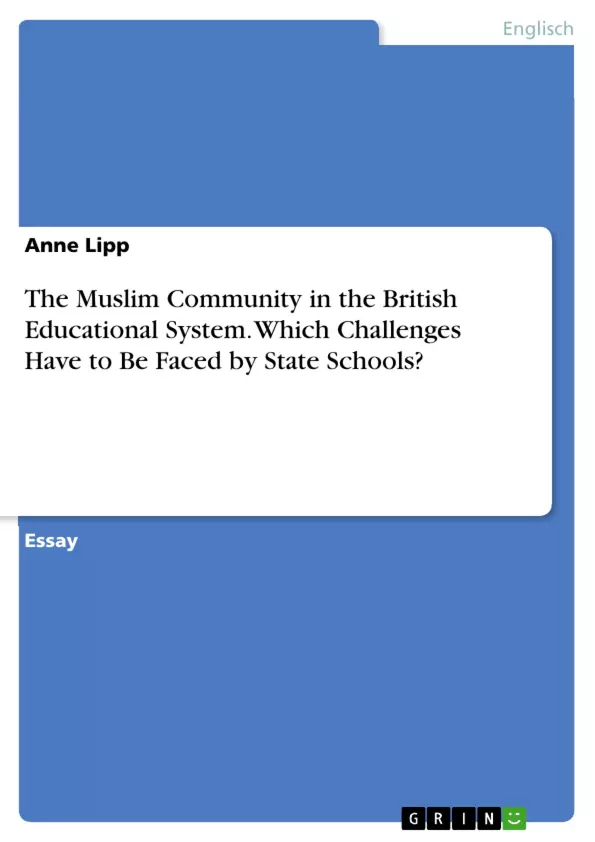Low academic achievements by Muslim pupils are still a problem in Britain at present time and this can obviously, since many have lived in England for generations, not only be justified by recent arrivals in England. Therefore, various investigations took place in order to explore other causes that might be responsible for the unequal achievements among pupils from Muslim and non-Muslim heritage. These matters call for more fundamental pedagogical and practical changes within English state schools.
According to the 2001 census the Muslim population in the United Kingdom contained a total of approximately 1.6 million. In 2010 the number estimated by the Pew Forum report was around 2.9 million, which would signify that it had nearly doubled within nine years. Taking this vast growth into account, it becomes obvious that the number of Muslim pupils in English schools will increase as well. Therefore the following question arises: What challenge must the English state school system face regarding a growing number of Muslim pupils?
Until the first Education Act in 1870, the Church of England mainly determined the education in England. Afterwards, the state began to take over responsibility as it demonstrated a commitment to provision of education on a national scale and financially supported various church schools. With this education act the foundation of board schools and the election of school boards took place on a local level.
After another education act in 1944 major parts of the responsibility for education laid in the hands of the state. Therefore, local education authorities such as counties or district councils were supposed to organize these schools. The only obligation they had was the “continuing commitment to religious education within the general state system” (Nielsen 54). Consequently, the teaching of religion and “daily collective acts of worship within school” (Nielsen 54) were obligatory and determined by law. However, these local authorities set the framework whereas head teachers also had significant influence with regard to the curriculum, selection of school staffs and books.
Inhaltsverzeichnis
Zielsetzung und Themenschwerpunkte
Dieser Text analysiert die Herausforderungen, denen das englische staatliche Schulsystem im Hinblick auf die steigende Zahl muslimischer Schüler gegenübersteht. Er untersucht die Notwendigkeit von Anpassungen im Lehrplan und in der Schulkultur, um eine inklusive und respektvolle Bildung für alle Schüler zu gewährleisten.
- Die Bedeutung einer inklusiven und multikulturellen Bildung im englischen Schulsystem
- Die Herausforderungen der Integration muslimischer Schüler in den bestehenden Lehrplan und in die Schulkultur
- Die Rolle von Lehrkräften bei der Förderung von interkulturellem Verständnis und Respekt
- Die Notwendigkeit, die Beiträge der muslimischen Gesellschaft zur europäischen Welt im Lehrplan zu berücksichtigen
- Die Notwendigkeit, die Bedürfnisse muslimischer Schüler hinsichtlich ihrer religiösen und kulturellen Identität zu berücksichtigen
Zusammenfassung der Kapitel
1. Introduction
Dieses Kapitel stellt die wachsende Zahl muslimischer Schüler in englischen Schulen als zentrale Herausforderung für das Bildungssystem dar. Es beleuchtet den historischen Kontext der staatlichen Schulbildung in England und die Entwicklungen im Zusammenhang mit der Integration von Migranten und muslimischen Schülern.
II. Various challenges that need to be faced by state schools
2.1 Changes in the curriculum
Dieses Kapitel argumentiert für eine Abkehr vom eurozentrischen Blickwinkel im Lehrplan und für eine stärkere Integration von multikulturellen Perspektiven. Es beleuchtet die Notwendigkeit, den Wissensschatz der islamischen Welt im Unterricht zu berücksichtigen, um ein tieferes Verständnis und einen respektvollen Umgang mit anderen Kulturen zu fördern.
2.2. Changes regarding school staff
Dieses Kapitel behandelt die Rolle von Lehrkräften bei der Förderung von interkulturellem Verständnis und der Einbeziehung muslimischer Schüler. Es beleuchtet die Notwendigkeit, die Bedürfnisse muslimischer Schüler hinsichtlich ihrer religiösen und kulturellen Identität zu berücksichtigen und angemessene Ressourcen für eine respektvolle und inklusive Bildung bereitzustellen.
Schlüsselwörter
Multikulturelle Bildung, Integration, muslimische Schüler, Lehrplanentwicklung, interkulturelles Verständnis, Respekt, Inklusion, Eurozentrismus, islamische Welt, Lehrkräftebildung.
Häufig gestellte Fragen
Welche Herausforderungen haben englische Schulen mit muslimischen Schülern?
Schulen stehen vor der Aufgabe, den Lehrplan und die Schulkultur so anzupassen, dass sie der wachsenden Zahl muslimischer Schüler gerecht werden, Inklusion fördern und religiöse Bedürfnisse respektieren.
Warum ist eine Lehrplanänderung für multikulturelle Bildung nötig?
Ein eurozentrischer Lehrplan vernachlässigt oft die Beiträge der islamischen Welt zur europäischen Geschichte. Eine Integration dieser Themen fördert das interkulturelle Verständnis und den gegenseitigen Respekt.
Welche Rolle spielen Lehrkräfte bei der Integration?
Lehrkräfte sind entscheidend für die Schaffung einer respektvollen Atmosphäre. Sie müssen für kulturelle Unterschiede sensibilisiert sein und Ressourcen bereitstellen, die die Identität aller Schüler stärken.
Wie hat sich das englische Bildungssystem historisch entwickelt?
Ursprünglich von der Church of England geprägt, übernahm der Staat ab 1870 mehr Verantwortung. Dennoch blieb religiöse Erziehung ein fester Bestandteil, was heute Anpassungen an eine multireligiöse Gesellschaft erfordert.
Warum erzielen muslimische Schüler oft geringere akademische Leistungen?
Untersuchungen zeigen, dass dies nicht nur an der Herkunft liegt, sondern auch an unzureichenden pädagogischen Ansätzen und fehlender Repräsentation ihrer Kultur im Schulsystem.
- Citation du texte
- Anne Lipp (Auteur), 2012, The Muslim Community in the British Educational System. Which Challenges Have to Be Faced by State Schools?, Munich, GRIN Verlag, https://www.grin.com/document/345100



